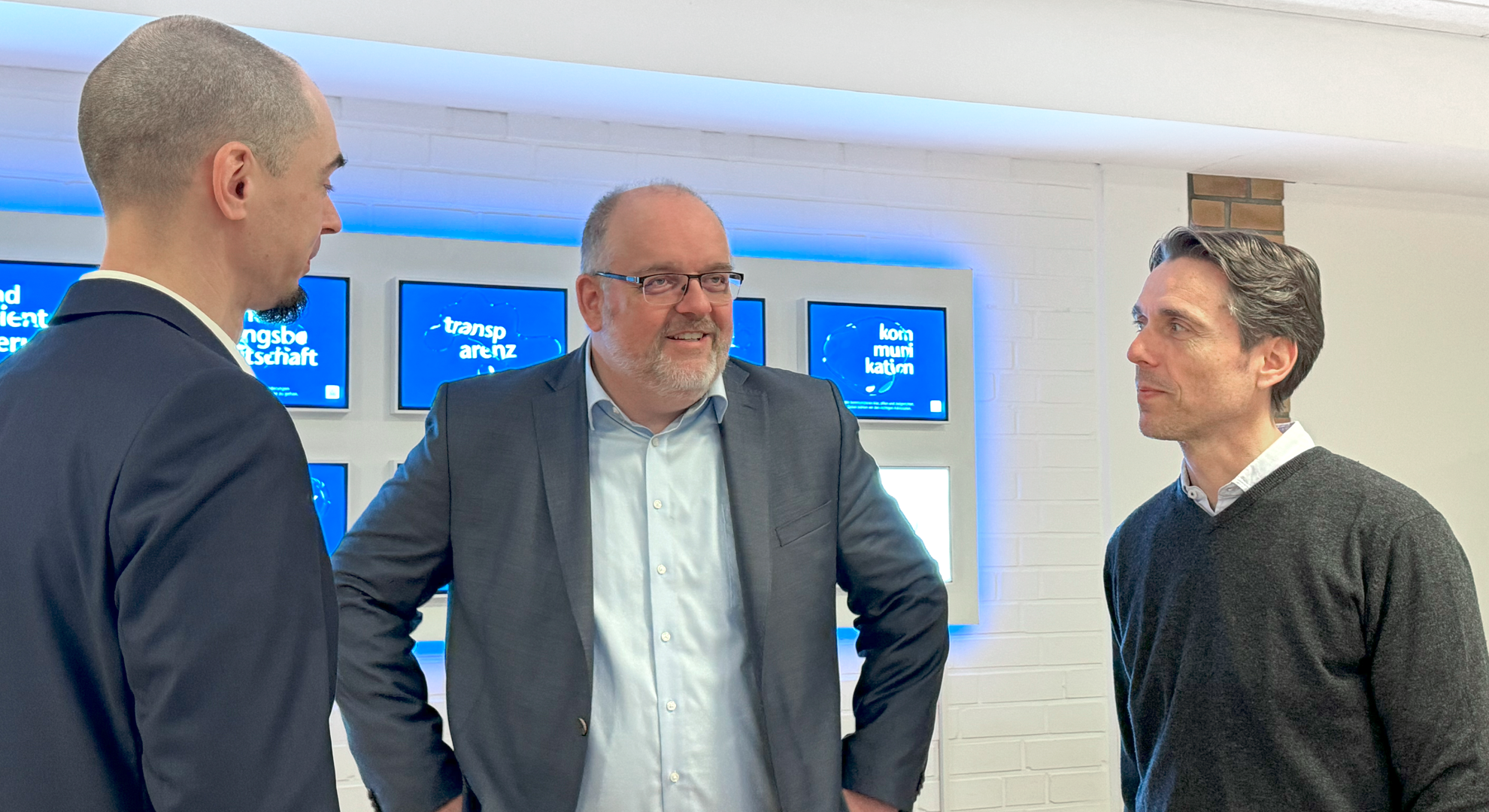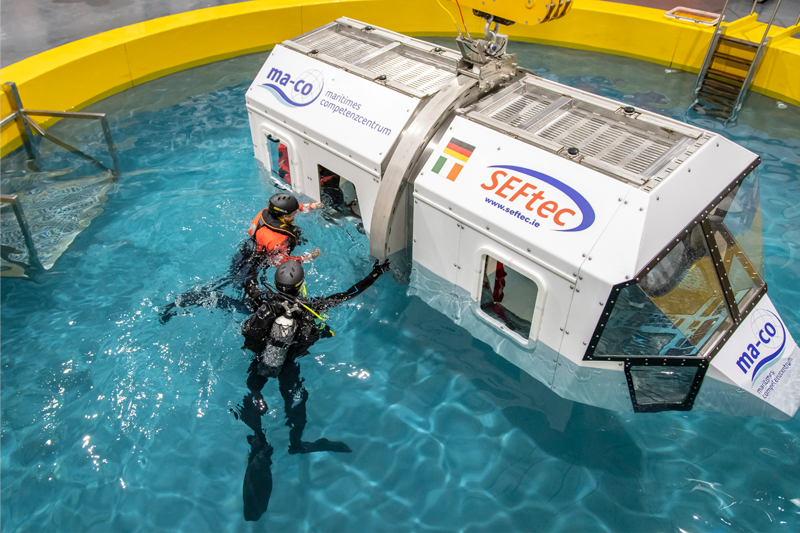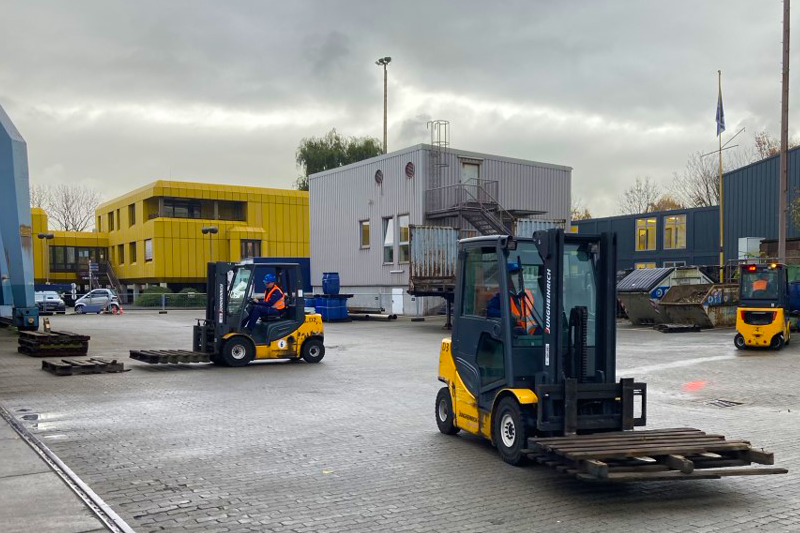Find your PORTjob
The shortage of skilled workers affects the maritime sector. To help companies find suitable candidates, Port of Hamburg Marketing has created a job portal ...

Mr Küther, Mr Lührs, what will jobs at the port look like in 2030?
Küther: We can’t predict that with any accuracy at this time. But the jobs in the port environment will undoubtedly change. After all, the digitalisation of many processes and increasing automation in many areas will result in new tasks for personnel. The requirements on the typical specialist for port logistics will fundamentally transform in the coming years. We are working with partners to define the job profiles of the future. We are doing this within the research project PortSkill 4.0 under the auspices of the Federal Ministry for Digital and Transport (FMDT), as part of the IHATEC II funding programme for innovative port technologies.
Lührs: Our focus is on people. In this project, we therefore ask how we can qualify the workforce to enable them to continue to perform their job effectively in the future.
How do you do this, practically speaking? How do you identify this need for qualification?
Küther: This is only possible in close dialogue with our partners – the companies in the port – and that is precisely what we do in our project PortSkill 4.0. Over the last two years, we have had many conversations and analysed the results. It became clear that a lot is going on at the port. Digital transformation is being implemented in many areas. We realised that we now need to accurately identify future competencies in order to develop relevant training programmes and courses.
What could these future competencies be?
Lührs: This doesn’t just include technical or digital skills. There are also people skills as well as certain activity and method-related competencies. Overall, we have identified around ten core competencies where there are significant overlaps between the different job profiles, which we would like to train using the new possibilities of the digital world.
What does this mean in practice?
ührs: This involves developing courses to train competencies using simulations – i.e. control stand simulations and computer simulations in a virtual world representing a remote control stand for gantry cranes, for example. These courses should not be confined to a single job profile, but take the form of networked training. In other words, a training situation may encompass multiple job profiles. This could include crane drivers, ship planners, process controllers and other people in maintenance and repair. They all encounter different scenarios with problems and extreme situations, which are played out virtually. This means soft skills such as problem-solving, structured working, communication skills and execution can also be trained.

How much progress has ma-co made in implementing this type of training?
Küther: We are currently setting up our digital test and training centre. We have rented premises at HHLA Container Terminal Altenwerder for precisely this purpose. A new ma-co site is being developed here that will be available to all companies in the port industry. There will also be branch offices at the ma-co sites in Hamburg and Bremen. All sites can then be virtually networked into an open system.
Who is involved in this project?
Lührs: This project was initiated by the social partner ver.di and the Central Association of German Seaport Operators (ZDS). BLG Logistics in Bremen and HHLA in Hamburg are also on board as partners, while we have assumed management of the consortium.
Küther: I’d also like to mention our project partner Patient Zero Games, based at the Digital Hub Logistics in Hamburg, who is handling all the IT requirements and IT implementation.
Has a date already been set for the inauguration?
Küther: A definitive date has not yet been set. But we plan to have an open day for our new training centre in the course of the year. The event is planned for the start of the fourth quarter of 2024.
Let’s talk about your current offering. Have your courses already changed as a result of increasing digitalisation?
Küther: For the most part, we are still working on adapting our courses. But we already changed much of our offering to e-learning formats during the pandemic. Today, we have reached the point where we have established our own e-learning platform. This means our commercial training courses in particular are more varied. There are e-learning components and self-study phases as well as in-person sessions. Back then, we laid the foundation for this in the “DigiPortskill2025” project as part of the “Transformation of Work” programme of the Federal Ministry of Labour and Social Affairs.
Lührs: Initially, we found this transition more difficult for our industrial programme. Here, many things have to be done in practical parts on site. Seeing, feeling and trying things out for yourself is very important. However, there are also theoretical phases that we can meanwhile cover via our e-learning platform. We are continuously adapting our modules according to the experience we gain.
Are companies already asking for digitised programmes?
Küther: This varies quite a lot. On the one hand, we still have classic training for skilled workers at the port. These involve a lot of hands-on modules covering certificates for forklifts and heavy-duty stackers or for conventional applications in securing cargo, for example. But many companies also ask for topics such as first aid and fire safety.
Lührs: On the other hand, many companies are considering strategic development and future competencies. For the participants, this raises the question of how they can work more effectively. This is where the projects we have previously mentioned come into play.
If I want to take one of your training courses, can I also do so as a private individual?
Küther: This happens from time to time. Private individuals from the nautical sector come to us who wish to brush up on their skills. They often take part in basic safety training. But mostly, it’s companies from the logistics and port industry that send us their employees to attain new skills, refresh their knowledge or learn something new.

Are there other partners you work with?
Küther: There is also another side to what we do. As a provider of further education, we work very closely with the Federal Employment Agency and team.arbeit.hamburg (Hamburg job centre). For decades, we have been taking care to qualify jobseekers where this opens the prospect of a new job. This means we look ahead and try to find companies that need staff in a certain area. We also make sure that the applicants are motivated to start a new job.
Lührs: Another important pillar of what we do are our qualification projects. Here, we work closely with the Federal Ministry of Labour and Social Affairs as part of the “Transformation of Work” programme. We are also involved in the “Social Partner Directive” programme, which deals with working structures based on social partnerships. As a result, we handle qualification projects on the one hand and research projects on the other.
I’d like to return to the practical procedure. Do I need a school-leaving certificate to participate in the courses?
Küther: Not necessarily. One of our classics in the port and logistics sector is the qualification programme in “power logistics” for jobseekers. There we start from zero. Instead, we offer applicant days for our selection process. Here, we don’t just consider qualifications but also soft skills as well as motivation and drive. Ultimately, our success depends on whether the participant then actually stays in the job. Only by achieving a suitable integration rate do we continue to earn the trust of our partners.
Lührs: We maintain close dialogue with many companies. Time and again, we hear that many companies are still looking for staff. So, jobseekers have good opportunities to find employment. There continues to be a clear need for staff especially in conventional work and in logistics.
Can you say roughly how many courses take place across all sites over the year and how many participants complete these courses each year?
Küther: Across all sites, it’s around 6,000 to 8,000 participants each year. We offer 150 seminars on average, divided into more than eight areas of competence. But we also have the flexibility to offer customers courses that go beyond these areas.
Can I start a training programme at any time or do I need to keep certain dates in mind?
Küther: It depends. We have set dates for the courses funded by the Federal Employment Agency and the job centre. These courses are offered at set intervals. This is also the case for our standard courses. But if companies want to train their employees in-house, we are very flexible and can come to the company’s premises.
One more question to conclude: if you could go back and choose a job at the port, what would it be?
Lührs: That’s a hard question to answer. I could imagine working in terminal development.
And how about you, Mr Küther?
Küther: I would definitely try doing something in planning and controlling. I find the field of technical automation particularly interesting here. I’d like to have an overview of the entire system.
The ma-co maritimes competenzcentrum is a learning provider for German seaports and with its predecessor institutions, has been operating for around 50 years. ma-co is partly funded by the social partner ver.di and the employers’ associations of the ports. The learning provider works with the large individual companies of the ports, such as HHLA, Eurogate, BLG and the overall port operator companies (GHBs). At the same time, ma-co offers many smaller companies in the port and logistics sector a comprehensive programme of further training and professional development.
The focus at ma-co lies on practical qualification with extensive outdoor facilities and training areas. The training vessel beneath Hamburg’s Köhlbrand Bridge is a beacon in practical training in the commercial and technical areas of the German port industry.
ma-co was originally created as a result of the merger of port colleges in Hamburg and Bremen during the development of JadeWeserPort. The learning provider started by qualifying a workforce of 220 jobseekers into port logistics specialists for the container terminal operator Eurogate WHV. Its core topics include further training and professional development in the port, throughput and logistics areas. In recent years, ma-co has substantially expanded the areas of maritime, offshore and safety/security training. In 2018, the learning provider opened the Maritime Rescue Training Centre (MRTC) with its own training pool in Hamburg, where it offers maritime safety and offshore training. The areas of hazardous goods and customs, management and communication as well as IT business training round off the programme offered by ma-co.